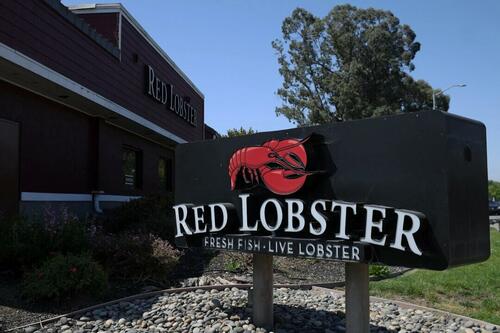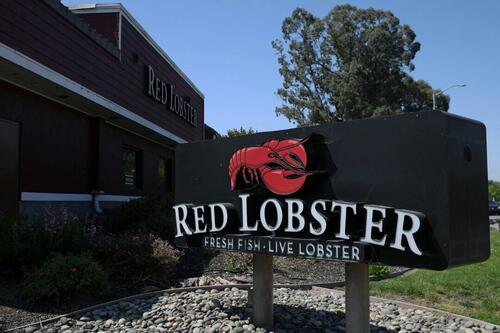
Persistent Economic Pressures, Changing Consumer Habits Send More Restaurants Into Bankruptcy
Authored by Mark Gilman via The Epoch Times (emphasis ours),
It’s been a rocky year for the restaurant industry, with rising costs due to inflation and changing consumer habits driving a slew of chains with household names into Chapter 11 bankruptcy. According to those who follow the industry, there is no definable silver lining ahead for an industry in deep trouble.
 A sign is posted in front of a Red Lobster restaurant in Fremont, Calif., on May 14, 2024. Justin Sullivan/Getty Images
A sign is posted in front of a Red Lobster restaurant in Fremont, Calif., on May 14, 2024. Justin Sullivan/Getty Images“Most restaurants lose money, and there’s a reason for that. It’s a hard business with low margins and trends that are hard to navigate,” Jonathan Carson, the co-CEO of market strategy company Stretto, told The Epoch Times.
“When you add higher prices and a continually and increasingly overburdened consumer balance sheet, I think it makes the industry prime for restructuring,” he said.
Carson, who handles business reorganizations, said his company is aware of at least 17 national restaurant chains that have filed for bankruptcy in 2024.
Among the higher profile restaurant casualties this year which have filed for Chapter 11 bankruptcy protection this year are Roti, Buca di Beppo, Tijuana Flats, Sticky’s finger Joint, and Red Lobster.
Consumer Habits Have Changed
Laura Adams, a money expert and award-winning author who also hosts the weekly Money Girl podcast, told The Epoch Times that changes in consumer habits such as cooking at home and ordering home delivery have especially plagued the fast-casual tier of the restaurant industry.
“Consumers who dine at lower-end restaurants are the ones who will stop dining out first, and they’ll be the last ones to return because of unaffordability,” she said. “I think people have become used to ordering out, eating casually at home, and wearing casual clothes while watching Netflix.”
One of the changes in the restaurant industry that exploded during the pandemic was home-delivery services like Uber Eats, Grubhub, and DoorDash. The delivery companies, though, take large commissions from restaurants already struggling to make a profit.
Doordash orders can take as much as a 30 percent commission from restaurants.
“Doordash is a double-edged sword. It gives you the opportunity to get more food to more people, but it takes a pretty sizeable chunk off the bottom line,” said Justin Winslow, president and CEO of the Michigan Restaurant and Lodging Association.
“In third-party delivery, you have a real prisoner’s dilemma. You either shun the opportunity and limit your top-line gross sales, or you accept it and realize your ability to profit from those customers is harder than those inside your restaurant,” he told The Epoch Times.
Doordash is now the top restaurant-delivery app in the United States. At the end of 2023, DoorDash had 550,000 partner restaurants and grocery stores using its platform. However, the company is still looking for its first quarter of profitability.
In a written response to The Epoch Times, DoorDash’s corporate communications group wrote: “Our mission at DoorDash is to grow and empower local economies, and we’ve built tools that help restaurants expand their business and reach more people in their community.”
A Variety of Issues
Adams said that to survive, restaurants must offer something unique to make consumers leave their homes to experience it.
“I think if companies can’t differentiate themselves, they’re going to have a hard time. Maybe a restaurant like Red Lobster gets transformed, but it’s sad to see such a well-known brand wither away. When you see folks cutting back on dining out, you need to offer something unique,” she said.
The reason behind many Chapter 11 restaurant-restructuring filings this year needs to be discussed more, according to Carson, who has more than 20 years of bankruptcy experience.
He believes many of the filings have much to do with getting out of rent agreements. “You can walk away from a lease with Chapter 11 bankruptcies. The company can take the liability off their PNL [profit and loss],” he said. “But you do still have some casualties along the way.”
As tough as the restaurant economic and consumer market is today, Winslow says the restaurants in his organization are still reeling from the response to the pandemic that ended two years ago.
“The long tail of COVID is still impacting this industry more than any others. We did a poll in June, and I wasn’t prepared for how severe the fallout has been, with 60 of our members losing foot traffic in the last year and only 25 seeing an increase in top-line sales,” Winslow said.
“Forty of them are currently not profitable, and two out of every five of our restaurants are at risk for closure in the near future.”
Asked if she would advise anyone to open a restaurant today in this economic environment, Adams said, “I would say it is one of the most difficult businesses you can choose to run, and I would make sure you have the expertise and a record of success before you do it.”
Tyler Durden
Tue, 09/03/2024 – 06:30

 1 rok temu
1 rok temu




![Grzegorz Braun „nagrodzony” przez białoruską organizację, działającą na rzecz Rosji [NEWS OKO.PRESS]](https://cdn.oko.press/cdn-cgi/image/trim=420;0;448;0,width=1200,quality=75/https://cdn.oko.press/2025/11/SK250915_0001823.jpg)











